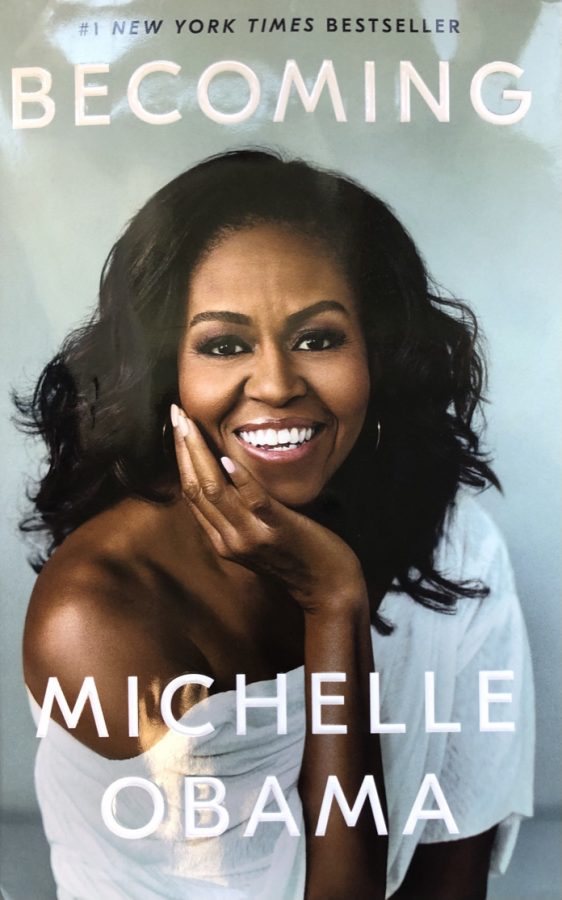Politics, race, family: Michelle Obama shares her challenges and triumphs in “Becoming”
What made the former first lady the woman she is today?
“Becoming” is a 421 page memoir by former first lady Michelle Obama that was first published on Nov. 13, 2018. Obama is also the author of “American Grown.”
April 9, 2021
Lucy’s ranking: ★★★★★
As I flipped through the first pages of Michelle Obama’s memoir, “Becoming,” I felt as if Obama herself was sitting next to me, speaking directly to me in a candid, conversational tone. Hours passed in what seemed like seconds as Obama recounted her upbringing, struggles and triumphs, from her childhood in the South Side of Chicago to becoming the first lady of the United States.
After hearing glowing reviews about this memoir for years, I finally got to reading it in February. Above all, I wanted to learn more concrete details about Michelle Obama’s life: although I’ve seen her name in the news, I still knew little about her experiences as the first African American first lady and the challenges she faced.
The memoir begins with Obama telling the reader about the nuances and details of her childhood in the South Side of Chicago, surrounded by family members. Obama’s fondness for her childhood shines through the pages as she recalls piano lessons with her aunt Robbie, her father’s perseverance in dealing with multiple sclerosis, her brother’s naturally outgoing personality and her mother’s calm presence.
As a high school student still contemplating my potential career choices, I found Obama’s professional path both fascinating and inspiring. After attending Princeton University and Harvard Law School, she entered the workforce as a corporate lawyer in her twenties. She recounted her challenges in finding meaningful work that spoke to her values, which eventually led to her quitting her job to instead work at Chicago City Hall. There, she helped run a newly established chapter of Public Allies, an organization that places young people into apprenticeships in community organizations and public agencies.
On her work at Public Allies, Obama recalls, “For the first time in my life, really, I felt I was doing something immediately meaningful, directly impacting the lives of others while also staying connected to both my city and my culture” (180).
Hearing about Obama’s work at Public Allies and in the government opened my eyes to new possibilities for pursuing one of my passions: politics. Obama’s openness to new career avenues also inspired me to consider broader options for my future, especially options that strongly align with my principles. And most importantly, I felt tremendously reassured to learn that a woman as influential as Obama also felt uncertainty at one point about decisions for her future.
Throughout her memoir, Obama openly discusses her experiences as a Black woman. She recalled feeling like she was “representing [her] race” at Princeton, where less than 9 percent of students in her class were Black and where some of her Black classmates experienced overt acts of racism (80). She shares her frustration with being stereotyped as an angry Black woman by certain media outlets after entering the political sphere. She writes, “It was as if there were some cartoon version of me out there wreaking havoc, a woman I kept hearing about but didn’t know—a too-tall, too-forceful, ready-to-emasculate Godzilla of a political wife” (264).
Notably, in her reflection of her and her husband’s eight-year presence in the White House, she alludes to present-day racism in America, pointing out that the presidency “had been celebrated by millions of Americans, but it also contributed to a reactionary sense of fear and resentment among others” (397). Her words reminded of the injustices Black Americans still face today and the continued necessity for working towards a more equitable, inclusive society.
To my surprise, Obama was initially hesitant about her husband’s presidential bid in the 2008 election. Having known her as the first lady as I was growing up, it was intriguing to learn that she had not always felt certain about her husband’s presidential campaign, which she feared would uproot her family’s lives. But after the political campaign begins, she describes how, after one particular Saturday’s rally, she felt energized by the citizens who showed up and was now “fully committed” to the campaign.
“We were asking for an investment of their faith, and now we had to deliver on what they’d brought us, carrying that enthusiasm through twenty months and fifty states and right into the White House,” Obama writes. “I hadn’t believed it was possible, but maybe now I did. This was the call-and-response of democracy, I realized, a contract forged person by person” (232).
Her memoir also gives the reader a fascinating glimpse into her eight years as the first lady and her initiatives during her time at the White House. She notes, “A First Lady’s power is a curious thing—as soft and undefined as the role itself” (372). Previous to reading her memoir, I had given little thought to the role of the first lady, and her account of her experience in the White House enlightened me about the flexibility of the job. Obama speaks about her public health initiative on promoting a healthier lifestyle, which includes an installation of a garden at the White House, as well as the criticism she faced from the media.
I would definitely recommend this book to another student, as Michelle Obama’s memoir offers compelling insights about race, American politics, education and family. I am enthralled by her life story and could not put the book down for hours on end. Although Obama did not hesitate to speak on more difficult topics in her memoir, such as dealing with a miscarriage and losing loved ones, her book also offered moments of lightness that made it especially enjoyable to read. Her honest but also ultimately optimistic tone made me hopeful about the future of America and American politics, and I felt empowered by her book to enact positive change in my own community.
“Becoming” is not just any memoir. Written by a powerful woman in America with a powerful story to tell about America, “Becoming” will challenge, excite and inspire you.


















![“[Building nerf blasters] became this outlet of creativity for me that hasn't been matched by anything else. The process [of] making a build complete to your desire is such a painstakingly difficult process, but I've had to learn from [the skills needed from] soldering to proper painting. There's so many different options for everything, if you think about it, it exists. The best part is [that] if it doesn't exist, you can build it yourself," Ishaan Parate said.](https://harkeraquila.com/wp-content/uploads/2022/08/DSC_8149-900x604.jpg)




![“When I came into high school, I was ready to be a follower. But DECA was a game changer for me. It helped me overcome my fear of public speaking, and it's played such a major role in who I've become today. To be able to successfully lead a chapter of 150 students, an officer team and be one of the upperclassmen I once really admired is something I'm [really] proud of,” Anvitha Tummala ('21) said.](https://harkeraquila.com/wp-content/uploads/2021/07/Screen-Shot-2021-07-25-at-9.50.05-AM-900x594.png)







![“I think getting up in the morning and having a sense of purpose [is exciting]. I think without a certain amount of drive, life is kind of obsolete and mundane, and I think having that every single day is what makes each day unique and kind of makes life exciting,” Neymika Jain (12) said.](https://harkeraquila.com/wp-content/uploads/2017/06/Screen-Shot-2017-06-03-at-4.54.16-PM.png)








![“My slogan is ‘slow feet, don’t eat, and I’m hungry.’ You need to run fast to get where you are–you aren't going to get those championships if you aren't fast,” Angel Cervantes (12) said. “I want to do well in school on my tests and in track and win championships for my team. I live by that, [and] I can do that anywhere: in the classroom or on the field.”](https://harkeraquila.com/wp-content/uploads/2018/06/DSC5146-900x601.jpg)
![“[Volleyball has] taught me how to fall correctly, and another thing it taught is that you don’t have to be the best at something to be good at it. If you just hit the ball in a smart way, then it still scores points and you’re good at it. You could be a background player and still make a much bigger impact on the team than you would think,” Anya Gert (’20) said.](https://harkeraquila.com/wp-content/uploads/2020/06/AnnaGert_JinTuan_HoHPhotoEdited-600x900.jpeg)

![“I'm not nearly there yet, but [my confidence has] definitely been getting better since I was pretty shy and timid coming into Harker my freshman year. I know that there's a lot of people that are really confident in what they do, and I really admire them. Everyone's so driven and that has really pushed me to kind of try to find my own place in high school and be more confident,” Alyssa Huang (’20) said.](https://harkeraquila.com/wp-content/uploads/2020/06/AlyssaHuang_EmilyChen_HoHPhoto-900x749.jpeg)











